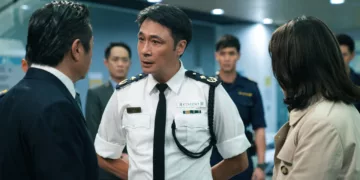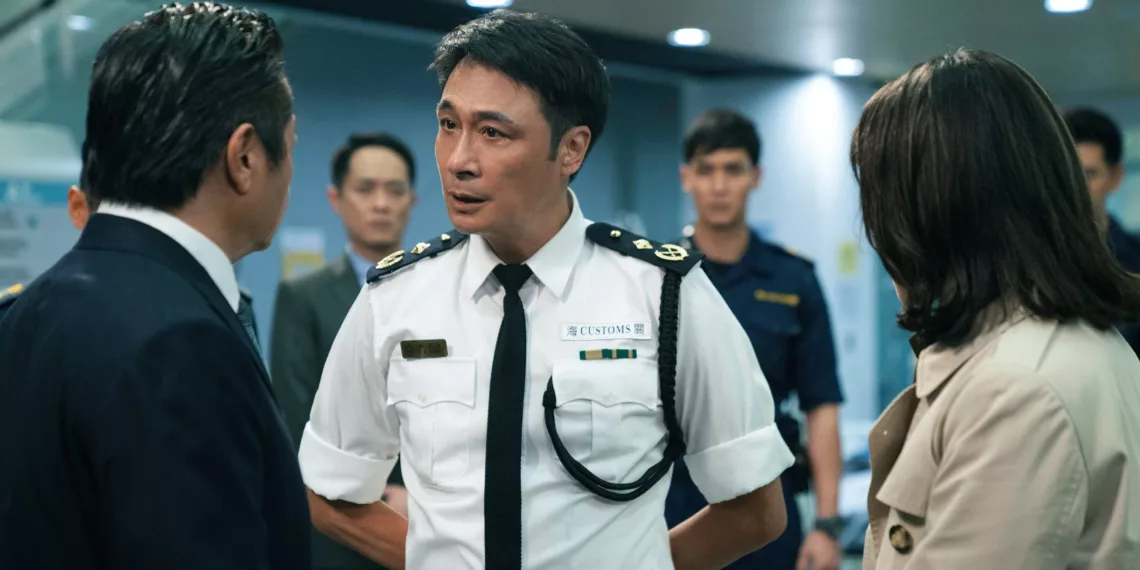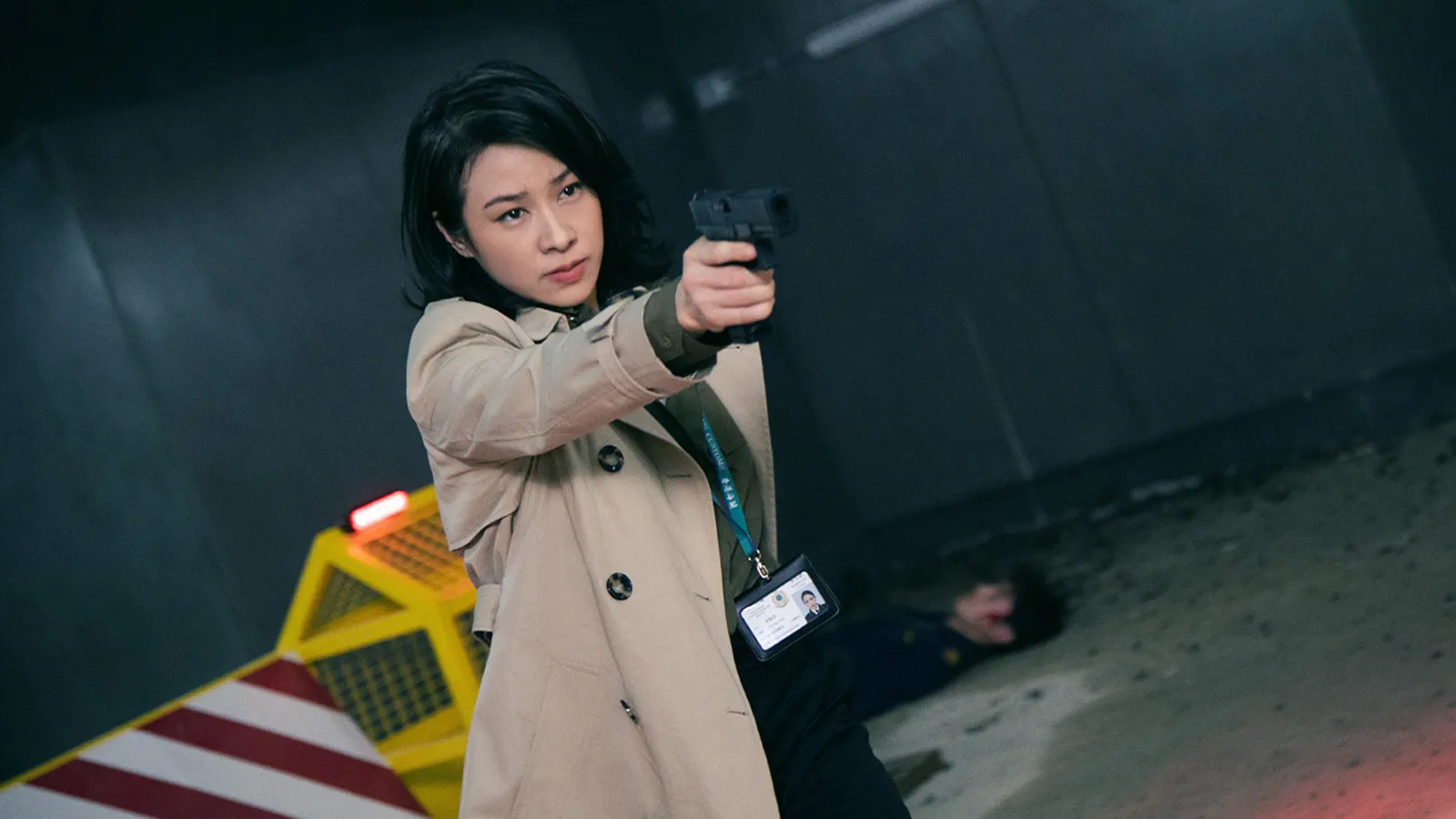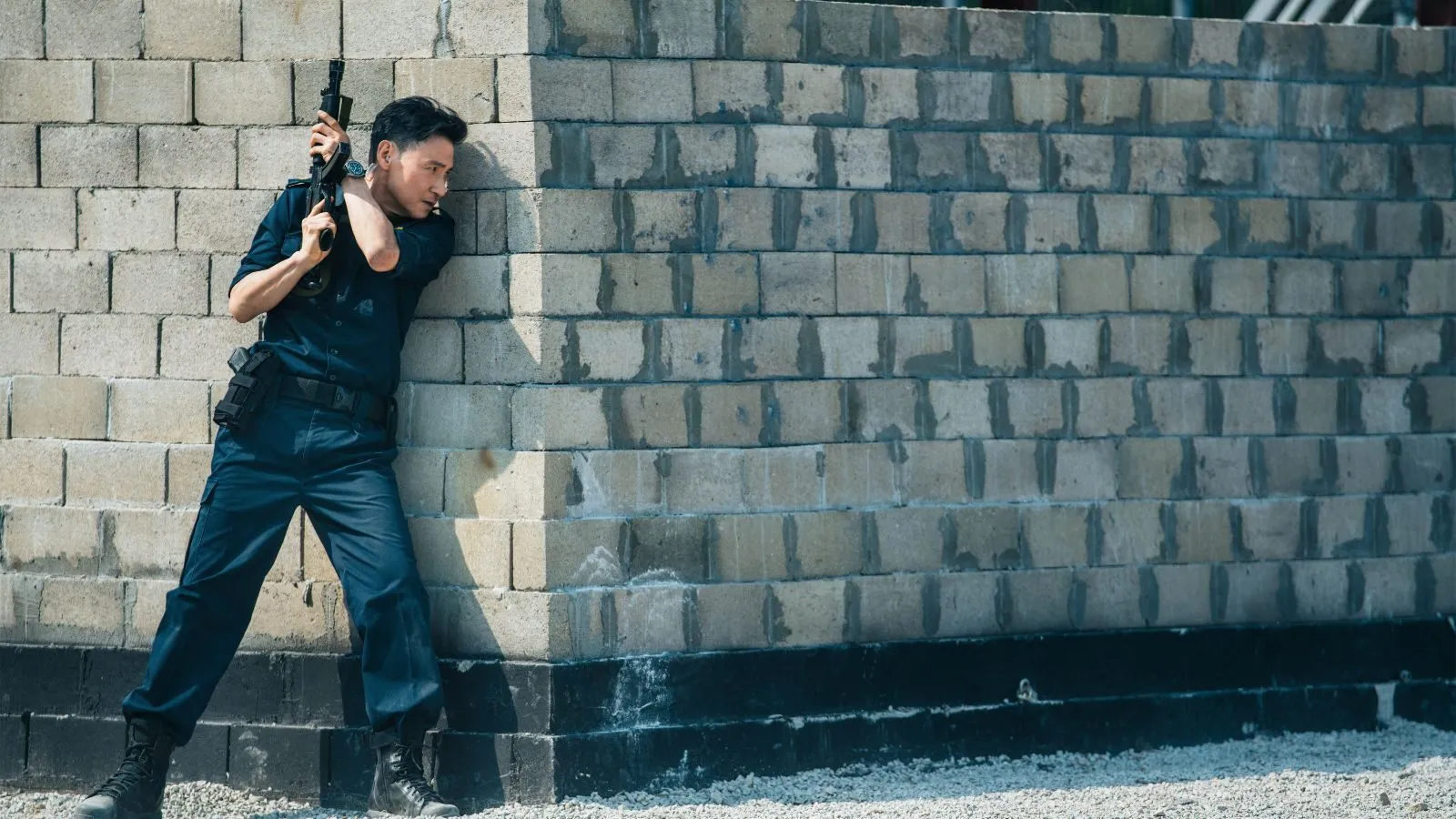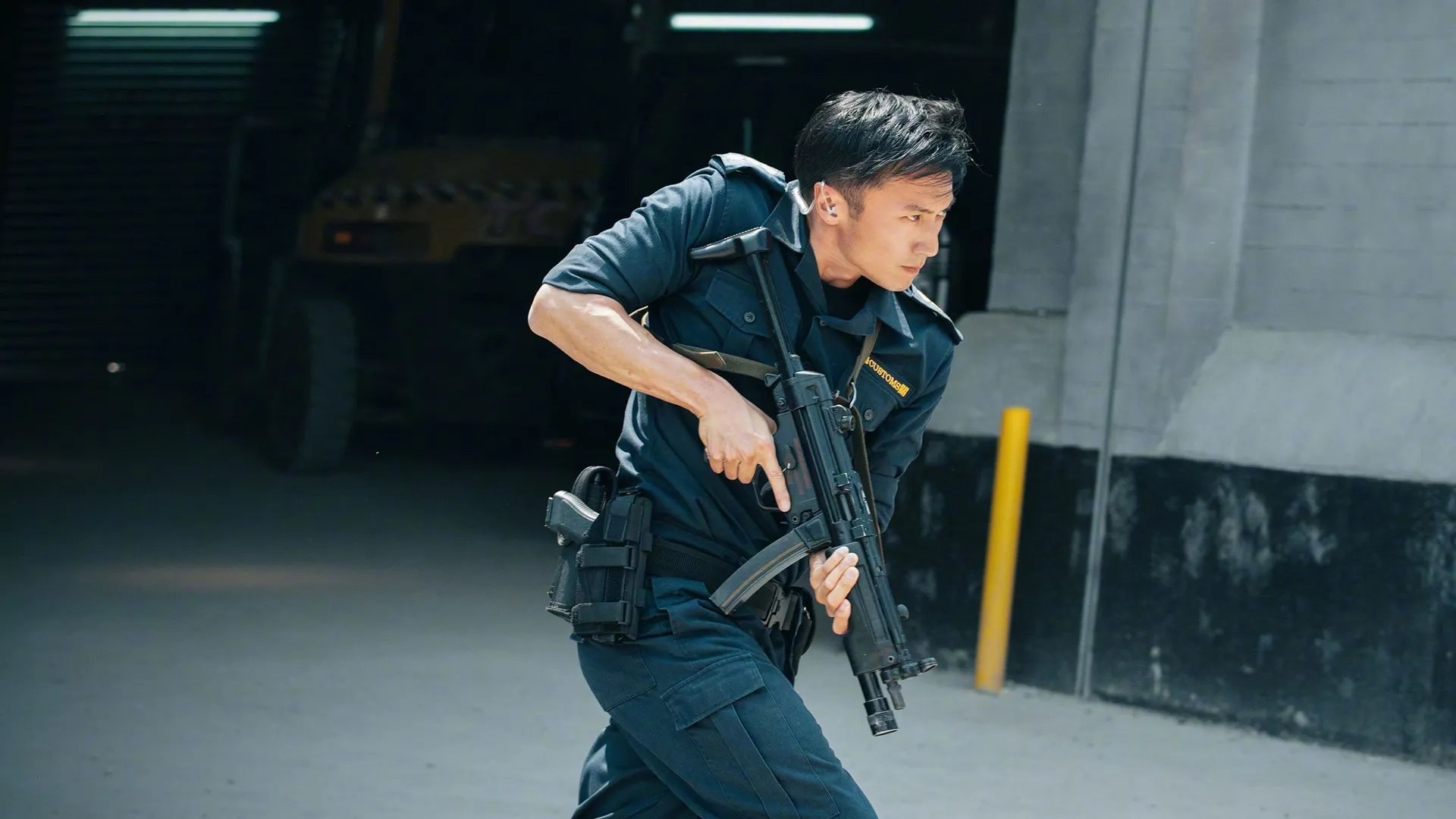Hong Kong’s Customs Department plays a vital role in maintaining security and order along the bustling waterways connecting the city to the rest of the world. Their officers work tirelessly each day, stopping ships, scrutinizing cargo, and keeping a watchful eye for any criminal activity. When one of their routine checks uncovers an illegal arms shipment bound for an escalating war in Africa, it sets two officers on a thrilling mission.
Nicholas Tse stars as Chow, a devoted officer trying to balance his duties with personal struggles. His mentor is the experienced but troubled Cheung, played compellingly by Jackie Cheung.
Under Cheung’s guidance, Chow works to untangle a smuggling ring led by the mysterious Dr. Raw. But this is no ordinary case—the investigation will test the officers’ skills and resolve, plunging them into dangerous undercover operations abroad and uncovering sinister forces much closer to home.
Directing the high-octane action is Herman Yau, known for gritty crime thrillers. Working alongside Tse, the film delivers intense shootouts and martial arts clashes. But Yau also aims to inject drama and complexity into the characters as they face mounting threats. This review will take a look at the thrilling action scenes, explore the officers’ compelling arcs, and examine how the story balances its non-stop momentum with attempts at exploring timely themes.
Thrilling Encounters
The screen bursts with energetic action as Customs Frontline wastes no time putting its characters in harm’s way. In one of the first major set pieces, the villainous Leo makes a bold attack on the officers’ storage facility to steal back the confiscated cargo.
As guns blaze and explosions roar, Nicholas Tse takes on a group of mercenaries in an intense battle atop a cargo container suspended by helicopter. It’s an enthralling display of Tse’s prowess.
But the intensity only grows from there. A frantic car chase through the busy streets of an African city pushes the limits, with vehicles weaving between oncoming traffic as attacks erupt around them. Tracer fire lights up the night as Tse and partners evade pursuit in another breathless pursuit.
The climactic missions are even more immense in scale. In a dazzling stretch, Tse and the crew infiltrate first a transport vessel, then a submarine, resulting in wall-to-wall shootouts. Choosing practical action over CGI creates a visceral sensation of danger. It all builds to the climactic showdown between Tse and Leo, their brutal hand-to-hand combat made more perilous by the flooding submarine hull.
Director Yau finds inventive ways to heighten the tension through original locations and clever stuntwork. While some CGI is present, it’s used judiciously, and the ambitious practical sequences are what linger with you. Through it all, Tse is a total standout—his martial arts skills and coordination as an action designer come together in exhilarating sequences that justify braving a few slower dramatic parts.
Officers Under Pressure
Nicholas Tse brings vitality to the leading role of Chow Ching-Lai, a dedicated officer juggling demanding duties with personal issues. He’s still figuring out his place both in his career and in the aftermath of a past relationship. This conveys Chow’s earnest nature while hinting at inner turmoil simmering beneath the surface.
Another complex character is Cheung, mentoring Chow as he battles undiagnosed mental health challenges. Jackie Cheung immerses himself in the role, suggesting Cheung’s mercurial moods through subtle facial shifts. His performance carries heft, revealing the humanity beneath the hierarchy. Cheung emerges as a sympathetic figure just trying to keep himself together as outside pressures intensify.
Dr. Raw, played by Amanda Strang, never feels fully realized despite efforts to provide motivation. As her top enforcer, Leo is effectively menacing thanks to Brahim Chab’s physical presence. But like Raw, Leo remains more of a plot device than a fully dimensional character.
Relationships between the officers feel like one of Customs Frontline’s stronger elements. Cheung receives staunch support from his partner Athena, played by Karena Lam with warmth and loyalty. And tensions arise regarding Cheung’s desires versus following the pragmatic directives of police chief Kwok Chi-keung.
While some characters lack complexity, Yau and the cast make attempts to convey pressed individuals brought closer by shared duty and discord. Glimpses at personal lives work to humanize the officers facing mounting threats. But with so many figures to service, not all receive sufficient attention to emerge as fully rounded personalities beyond occupational roles.
Still, Tse and Cheung anchor the ensemble with nuanced work. And their on-screen rapport, as Chow looks to the experienced but strained Cheung for guidance, becomes another relatable thread binding the narrative together during its most grounded moments.
Weaving Together Action and Intrigue
Customs Frontline takes on weighty subjects like arms trafficking and political instability, albeit with an uneven hand. The main plot concerns a smuggling ring funneling weapons through Hong Kong to fuel conflict in Africa. It’s an ambitious scope, touching on corporate corruption and the human toll of war.
Lesser subplots examine mental health challenges facing one officer and bureaucratic power plays within the department. But these thought-provoking threads are mostly paint-by-numbers instead of in-depth character studies. While admirable intentions, the script struggles under its complexity alongside non-stop action.
Perhaps this partly explains Yau’s focus on propelling action over character exploration. But it does leave some themes half-baked. For example, its depiction of African warrings feels reductive.
Still, for all its narrative unevenness, the interweaving of personal dilemmas with a globe-trotting conspiracy gives Customs Frontline momentum. Its heroic agents battling insidious forces gives the film purpose beyond pulpy thrills.
And its subtle pro-Chinese message—of customs agents as defenders of trade and regional stability—reflects a real geopolitical backdrop. So while some topics feel shortchanged, their inclusion taps into issues meaningful to audiences.
Ultimately, this sprawling plot serves as an effective vehicle for exhilarating set pieces and showcasing its talented stars. And that may be praise enough for an entertaining popcorn flick not aiming to break new dramatic ground.
Bringing the Vision to Life
Behind it all steering the ship is director Herman Yau. With a keen sense of pacing, he orchestrates Customs Frontline’s shifting tones—breathless action punctuating weightier dramatic moments. This requires deft handling, and Yau proves up to the task.
His direction draws deeply layered work from the actors. Perhaps most notably, Yau cultivates a captivating performance from Jackie Cheung full of fragile vulnerability beneath steely resolve. Yet Yau allows emotive nuance from all, breathing life into the characters.
Complimenting Yau’s vision, golden-hued cinematography embraces Hong Kong’s waterfront beauty while glorifying the kinetic action. Fight scenes and frenzied pursuits flow fluidly, with sweeping camerawork intensifying each blow. A special mention goes to inventive stuntcoordination, a hallmark of Hong Kong cinema.
As for the score, it swells at just the right instants. Whether amplifying tension or releasing euphoria, music nourishes select scenes. Though not altogether memorable, it fulfills its role—a supporting player like all else in service of Yau’s bracing adventure.
Through creativity behind and before the camera, Yau spins a visceral yarn. Customs Frontline lives through its makers’ passion, their expertise nurturing its pulse-pounding charms.
Room for Improvement
While Customs Frontline aims high in weaving action with character drama, it reaches greater heights in some areas than others. The film takes a stab at multi-dimensional figures, but not all receive their due attention.
Specifically, Cheung emerges as the most explored personality thanks to layered motifs like his illness. However, other complex threads feel abbreviated, such as the villain’s motivation. And plot conveniences, like deducing the traitor, lack conviction.
Pacing is another issue, with momentum waning as the middle drags during lulls between big set pieces. You start checking your watch, craving the return of fists flying and bullets blazing.
It’s a missed chance, since Yau and company clearly care about injecting heart among the hard-hitting heroics. But perhaps spreading the focus too thin dilutes the impact.
In the end, Customs Frontline makes for an entertaining popcorn flick. But it also indicates room for growth, both in tightening narratives and fleshing out characters beyond surface details.
Fans will find solid action worth the price of some admission. But this entry arguably represents missed potential versus Yau and Tse’s very best work. With refinement, they could elevate the drama to match their explosive skills.
A Satisfying Ride, If Flawed
When all is said and done, Customs Frontline delivers entertainment through its kinetic action spectacle. Director Yau and star Tse make the most of their skills in crafting exhilarating skirmishes. Fans of the duo will find their hard work merits a viewing, if only to witness such prowess on full display.
As a mainland Chinese production, it succeeds respectably in providing two hours of pulse-pounding fun. But for those seeking more substance amid the stuntwork, some storytelling fumbles take the edge off.
Ultimately, Customs Frontline is a passable way to while away an afternoon with over-the-top fights dazzling in spite of issues elsewhere. Newcomers need not feel compelled, but aficionados of Hong Kong action will find flashes of brilliance in a sometimes uneven feature. When the reels start rolling, Tse’s command keeps spectacles sublime from beginning to end.
The Review
Customs Frontline
With kinetic stunts and solid turns from its stars, Customs Frontline delivers entertainment through non-stop action. However, narrative stumbles and underdeveloped characters dilute an otherwise enjoyable ride.
PROS
- Impressive martial arts and gunfight choreography
- Memorable vehicle stunt sequences
- Committed performances from Tse and Cheung
CONS
- Confusing and convoluted plotline
- One-dimensional villains
- Uneven pacing with slow dramatic stretches
